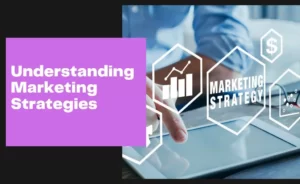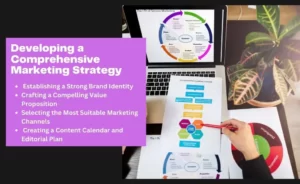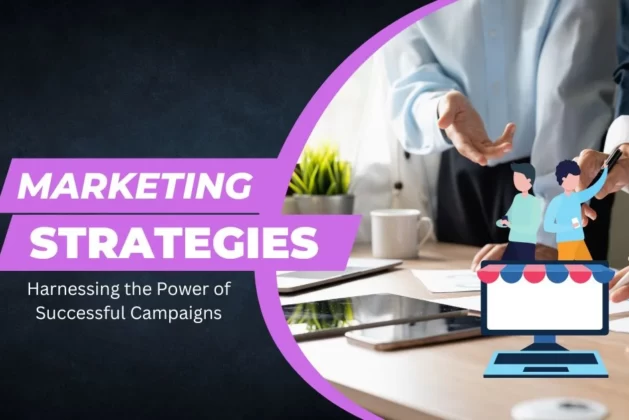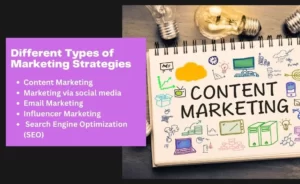Table of Contents
ToggleIntroduction
In today’s extremely competitive corporate environment, marketing strategies are essential for accomplishing business objectives and fostering success. Having a clearly defined and successful marketing plan is essential as companies try to stand out and connect with their target audience. This blog will explore the significance of marketing techniques and offer a thorough summary of the subjects discussed.
Businesses use marketing strategies as a road map to assist them to achieve their goals and move through the competitive marketplace. These tactics are crucial for a variety of reasons.
First and foremost, they give organizations the ability to recognise and comprehend their target market, ensuring that their efforts are focused on the correct individuals. Businesses may customize their communications and products to potential customers by understanding their audience, which will ultimately increase their chances of conversion and customer retention.
Additionally, marketing plans give companies a structure for establishing specific, quantifiable objectives. These objectives may involve boosting client loyalty, growing the market, raising brand awareness, or boosting sales. By establishing these goals, firms may direct their resources and efforts accordingly, resulting in a more targeted and successful marketing strategy.
Understanding Marketing Strategies

Marketing strategies are a collection of organized and coordinated actions intended to accomplish particular marketing goals. They provide a road plan for companies to market their goods or services successfully, draw in and keep customers, and eventually increase profitability.
A wide range of topics, including market segmentation, targeting, positioning, messaging, and promotional channels, are covered by marketing strategies.
A comprehensive strategy is used in marketing campaigns that support the overarching objectives of the company. They take into account things like the demographics of the target market, market trends, competitive analyses, and the distinctive value proposition of the company.
Businesses can improve brand exposure, build a positive brand image, and gain a competitive edge in the market by effectively planning and implementing marketing campaigns.
Why Businesses Need Well-Defined Marketing Strategies
Businesses must have well defined marketing strategies if they want to succeed in the cutthroat environment of today. They give marketing initiatives direction and purpose, ensuring that resources are used efficiently and that all actions are in line with the larger business goals.
Businesses require marketing strategies to stay flexible and responsive given how quickly customer preferences are changing and how the market is continuously changing. Businesses may anticipate market shifts, spot new trends, and exploit new opportunities by having a clearly defined strategy. They are able to stay one step ahead of rivals and continue to be relevant from the perspective of their intended audience.
Differentiating Between Marketing Tactics and Marketing Strategies
It’s critical to distinguish between marketing strategy and methods. Strategies cover the general plan and structure that direct these tactics, whilst tactics describe the individual actions and tools used to attain marketing goals. The tools used to carry out the strategy are called tactics.
Activities like social media advertising, content production, email campaigns, search engine optimisation, and influencer collaborations are examples of marketing methods.
On the other hand, marketing strategies entail the thoughtful selection and fusion of various methods in order to accomplish long-term goals. Target audience, competition analysis, market positioning, and desired brand perception are just a few examples of the aspects that are considered in strategies that are focused on the larger picture.
Key Elements of Effective Marketing Strategies

The creation of buyer personas and the identification of the target audience are two important components of successful marketing campaigns. Finding the precise demographics, psychographics, behaviours, and demands of the perfect clients entails doing this.
Businesses can adjust their marketing messages and efforts to resonate more deeply with their potential customers by understanding the target audience. Buyer personas help companies create individualized and effective marketing activities by painting a clear picture of the preferences, problems, and motivations of the target audience.
Setting Clear and Measurable Goals
For marketing initiatives to be effective, goals must be specific and measurable. These objectives should be SMART (specific, measurable, achievable, relevant, and time-bound) and in line with the overarching corporate objectives.
Having clearly defined objectives gives marketing activities focus and direction, whether the objective is to raise brand awareness, produce leads, increase sales, or improve customer interaction. To monitor the development and success of the marketing plans, precise metrics and key performance indicators (KPIs) should be defined.
Conducting Thorough Market Research
Effective marketing strategy must include thorough market research. Data about the target market, market trends, customer behaviour, and rivals must be gathered and analyzed.
Businesses can learn more about customer preferences, new market prospects, and potential difficulties by conducting market research. Businesses may make informed judgements, pinpoint unique selling propositions, and customize their marketing tactics to stand out in the market by having a thorough awareness of the market landscape.
Analyzing Competition and Industry Trends
For an organization to remain innovative and competitive, industry trends and competition analysis are essential. Businesses can pinpoint their strengths, shortcomings, and distinctive value propositions by looking at the strategies and tactics of rival companies.
This study offers insightful information on market gaps, unrealized potential, and places where companies may set themselves apart. Additionally, keeping up with market developments and trends enables firms to foresee changes, modify their plans, and continue to be relevant to their target market.
Check out:-
- Meesho – India’s One of the Most Successful Business Models
- LinkedIn Business Story | Benefits, Career & Personal Development
Exploring Different Types of Marketing Strategies
Content Marketing
information marketing necessitates the creation and distribution of strong, relevant, and consistent information in order to capture and hold the attention of a target audience. It focuses on delivering engaging, amusing, or educational information that speaks to the needs and interests of the audience.
Among the many formats that content marketing can take are blog posts, videos, podcasts, infographics, and ebooks. Businesses may develop trust, establish thought leadership, and ultimately increase consumer engagement and conversions by providing quality content.
Marketing via social media
Using social media channels to connect with the target audience, increase brand exposure, and promote engagement is known as social media marketing.
Running social media advertising campaigns, interacting with followers, generating and distributing content, and examining social media metrics are all included. Platforms for social media like Facebook, Instagram, Twitter, LinkedIn, and YouTube offer opportunities for businesses to reach a wide audience.
Email Marketing
Sending targeted emails to a segmented audience is a direct and personalized marketing method known as email marketing. It can be used to cultivate leads, advertise goods or services, provide beneficial content, and interact with clients.
Building a subscriber list, creating eye-catching email content, maximizing email deliverability, and tracking campaign performance are all key components of successful email marketing campaigns. Businesses may increase open rates, click-through rates, and conversions with the right segmentation and personalisation.
Influencer Marketing
Influencer marketing centers on partnering with influencers, or people with a sizable following and sway in a certain sector or area. Businesses can use influencers’ credibility and viewership to market their goods and services by collaborating with them.
Influencer marketing can be done through collaborations, reviews, endorsements, or paid material. It might be a good method to attract new client groups, increase brand recognition, and foster trust.
Search Engine Optimization (SEO)
The goal of search engine optimisation (SEO) is to make websites and content more visible and higher ranking in search engine results. It uses a variety of strategies, including technical optimisations, link development, and keyword research.
Businesses may boost their online presence, increase organic traffic, and improve search engine ranks by optimizing for relevant keywords and producing high-quality content.
Pay-Per-Click (PPC) Advertising
Businesses engage in PPC advertising, a type of internet advertising, where they pay each time a user clicks on one of their adverts. Ads are typically displayed on search engines or other platforms while keywords are bid on.
PPC advertising enables companies to target particular keywords, groups of people, and geographic areas to make sure their ads are seen by the right people. It is a powerful tactic for directing targeted traffic and generating leads because it gives control over budget allocation and instant visibility in search results.
Guerrilla Marketing
Guerrilla marketing is a unique and innovative form of advertising that tries to leave a lasting impression on the target market. It entails utilizing innovative strategies, frequently on a tight budget, to garner attention and generate buzz.
Stunts, street art, viral films, and interactive experiences can all be a part of guerilla marketing efforts. Businesses may increase brand exposure and word-of-mouth marketing by thinking outside the box and providing memorable experiences.
Event Marketing
Event marketing is the process of planning or taking part in events to advertise goods or services, interact with the target market, and build brand experiences. Trade exhibitions, conferences, webinars, and workshops are all examples of events.
Businesses can present their products at events, engage with potential customers directly, and create lasting connections. It provides chances for lead creation, networking, and brand exposure.
Referral Marketing
Utilizing the influence of word-of-mouth, referral marketing helps businesses gain new clients by soliciting referrals from current ones. It entails rewarding clients who recommend the company to their friends, relatives, or coworkers. Programmes for referral marketing may provide discounts.
Also Visit:- analytics.in/blogs for more interesting blogs
Developing a Comprehensive Marketing Strategy

Establishing a Strong Brand Identity
An essential component of an efficient marketing plan is creating a strong brand identity. It entails defining the brand’s character, principles, purpose, and selling point. Businesses may stand out from rivals, connect with their target market, and foster brand loyalty by developing a distinct and consistent brand identity.
This includes creating a visually appealing brand logo, deciding on brand colours and fonts, and developing brand messaging that is consistent with the tastes and goals of the target market.
Crafting a Compelling Value Proposition
A strong marketing strategy must have a compelling value proposition. It outlines the special advantages and value that a good or service provides to consumers.
Businesses can create a value proposition that addresses the unique problems faced by the target audience and offers their offering as the best answer by first knowing their wants and pain areas. A compelling value proposition persuades potential customers to interact and make a purchase by clearly communicating the advantages of picking the company over rivals.
Selecting the Most Suitable Marketing Channels
To effectively reach and engage the target audience, the best marketing channels must be selected. It necessitates comprehending the traits and preferences of the target market and choosing channels that are consistent with their actions.
This could use a mix of different channels, such as social networking sites, search engines, email marketing, content marketing, offline advertising, and so on. Businesses can increase their reach, make the most of their marketing budget, and make sure their message is delivered to the appropriate audience at the appropriate time by choosing the proper mix of channels.
Creating a Content Calendar and Editorial Plan
A thorough marketing strategy must be carried out using a content calendar and editorial plan. They aid companies in organizing and planning their efforts for content development, distribution, and promotion. The subjects, formats, and publication dates are laid out in a content calendar, assuring a steady stream of content to engage the audience.
In order to connect with the brand’s objectives and appeal to the target audience, an editorial plan specifies the essential topics, messaging, and storytelling techniques. These strategies maximize the impact of content marketing campaigns by providing structure, consistency, and strategic direction.
Setting a Budget and Allocating Resources
A crucial part of a marketing strategy is setting a budget and allocating resources. Businesses must assess the labour and financial resources needed to successfully implement various marketing strategies.
A clearly established budget ensures that marketing initiatives are sufficiently funded and in line with the larger corporate goals. Businesses can invest in the most effective techniques, track ROI, and modify their strategies by strategically allocating resources.
Implementing and Monitoring the Strategy
A thorough marketing plan must go through critical phases of implementation and monitoring. Businesses must carry out their strategies by putting the planned methods, campaigns, and initiatives into action after they have been defined. This entails organizing numerous teams, controlling deadlines, and assuring successful completion.
Monitoring and evaluating the effectiveness of the adopted approach is also crucial. To evaluate the efficacy of the marketing efforts, key indicators including website traffic, conversions, engagement rates, and sales should be monitored.
Businesses can better their overall marketing strategies by identifying areas for improvement, optimizing campaigns, and making data-driven decisions.
Evaluating and Measuring Marketing Strategies

Key Performance Indicators (KPIs) to Track
Finding and monitoring key performance indicators (KPIs) is crucial for assessing the efficacy of marketing campaigns. KPIs are particular measurements that are used to gauge the effectiveness and impact of marketing initiatives.
Indicators including website traffic, conversion rates, lead generation, customer acquisition cost, customer lifetime value, social media engagement, and return on investment (ROI) may be included in the KPIs chosen depending on the goals of the marketing plan.
Businesses can evaluate the effectiveness of their marketing tactics and gather knowledge about how they affect the overarching business goals by monitoring the KPIs that matter.
Analyzing Data and Metrics
A crucial component in assessing marketing tactics is data and metric analysis. Data from numerous sources, including website analytics, social media platforms, email marketing software, and customer relationship management (CRM) systems, are gathered and analyzed in this process.
Businesses can learn more about consumer behaviour, advertising effectiveness, audience demographics, and other pertinent elements by looking at these indicators.
Businesses can use this analysis to find trends, opportunities, strengths, and weaknesses so they can improve their marketing strategies and make informed decisions.
Adjusting and Optimizing Strategies Based on Results
To increase the success of marketing strategies, it is critical to modify and optimize them based on data and metrics analysis. This includes determining where work needs to be done, fixing any issues, and building on proven strategies.
A variety of strategy components, including messaging, targeting, channels, content, and campaign timing, can be changed. For instance, resources may be reassigned to less effective marketing channels if they are underperforming. Future campaigns can use the same messaging strategy if it is well received by the target audience.
The secret is to be flexible and nimble, constantly modifying and improving marketing plans depending on the knowledge discovered through data analysis.
Conclusion
In conclusion, the success of a business is greatly influenced by its marketing methods. Businesses can maximize their marketing efforts and achieve their desired results by comprehending the major components, investigating various sorts of tactics, making plans, analyzing results, and staying ahead of evolving trends.
Continuous learning, adaptability, and a dedication to providing value to the target audience are necessary steps on the path to developing great marketing strategies. To position your company for long-term success, use these methods, stay informed, and accept the always-changing marketing landscape.
Suggested Blogs:-
Frequently Asked Questions (FAQs)
Some of the most effective marketing strategies for small businesses include leveraging social media platforms, implementing content marketing, optimizing local search, utilizing email marketing campaigns, and collaborating with influencers in their niche.
The success of marketing strategies can be measured through various key performance indicators (KPIs) such as website traffic, conversion rates, social media engagement, customer acquisition cost, and return on investment (ROI). By tracking these metrics, businesses can evaluate the effectiveness of their marketing efforts.
Personalization plays a crucial role in marketing strategies as it allows businesses to tailor their messages, content, and offers to individual customers. By providing personalized experiences, businesses can enhance customer engagement, and loyalty, and ultimately drive conversions.
Artificial intelligence (AI) can greatly assist in marketing strategies by automating repetitive tasks, analyzing data to uncover insights, and enabling personalized recommendations. AI-powered tools can enhance targeting, optimize advertising campaigns, and improve overall efficiency in marketing operations.
Storytelling is a powerful tool in marketing strategies as it helps businesses connect emotionally with their target audience.
By telling compelling stories that resonate with customers, businesses can create a memorable brand image, generate interest in their products or services, and foster a deeper connection with their audience.




